Safekeeping by Karen Hesse
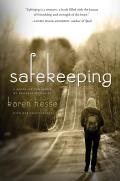
Teenage Radley Parker-Hughes is volunteering at an orphanage in Haiti when the President of the United States is assassinated. Despite the reports that have managed to filter to her remote location, Radley decides that she must return home to be with her parents during this time of unrest. When she arrives in Manchester, New Hampshire, she finds the country under martial law. Her parents' phone has been disconnected. She can't take a bus to Battleboro because she lacks the appropriate travel documents for crossing state lines. Radley's only choice is to walk home along country roads, trying to avoid being caught out after the newly imposed curfews.
With no money (her emergency credit card is now a useless piece of plastic) or food, Radley is reduced to foraging in dumpsters along the way. That she manages to arrive home safe and sound seems like a victory. Her parents, though, are not at home. It seems that they have disappeared, leaving all of their belongings behind. Radley locks herself inside the house, hiding whenever the police make their increasingly frequent visits, and eating all of the food in the pantry. Eventually she resigns herself to the pointlessness of remaining in Battleboro and decides to go to Canada...
I discovered
Safekeeping among the featured recently-acquired titles in the teen room of the public library. I was sold on the cover art and flap text, especially this bit:
Illustrated by 90 of her own haunting and beautiful photographs, this is a vision of a future America that only Karen Hesse could write: real, gripping, and deeply personal.
But I have to admit disappointment with the novel. While I do appreciate that
Safekeeping is a stand-alone novel,
1 I am dissatisfied with how easily Hesse ties everything up. That, combined with the fact that readers are never given a full backstory for the political and societal unrest, leaves the dystopian premise feeling insubstantial.
The story is very much character-driven and Radley's coming-of-age is the true center of the novel. Hesse does a wonderful job bringing Radley up and using the privations of the situation to facilitate that up-bringing. My disappointment is in how easy everything seems to be for Radley (all the truly awful things happen to other people) and how distant the threat seems to be. In short,
Safekeeping seems like Dystopia light.
L: A Novel History2 (which I read earlier this year) is constructed around a similar blip-in-the-history-of-the-nation kind of Dystopia. However,
L's Dystopia was as horrifying (or more so) as any other I've encountered in fiction (to the point where I could only read the novel in small doses). What I wanted for
Safekeeping was for more of the feeling that hell
had broken loose (that phrase is used on the flap as well as within the novel) even if only for a time. Then again, limiting the reach of the threat may have been a goal. It does make the novel more palatable for younger readers.
The photographs are indeed both haunting and beautiful. I also love the idea that Hesse took them while tracing the same route she has Radley walk (as described in "about the author," 293-294) and that the "feet-on-the-ground research contributed to the authenticity of Radley's narrative." However, the placement of the photographs within the novel is inconsistent. Sometimes a photo matches the prose almost too perfectly, while at others the image seems at odds with the text.
One final comment -
The library copy of the novel was marked with a science-fiction spine sticker. That categorization is so off that I can only imagine that dystopian fiction is now considered (at least by some) a subgenre of SciFi. In any case, there is nothing in
Safekeeping that I associate with science fiction. The novel is set in the future, but that imagined future is so near that it could happen tomorrow.
- I do like series, but is seems like so much that is being published nowadays (especially in YA fiction) is a trilogy or quartet or longer series.
- I received a review copy via NetGalley.
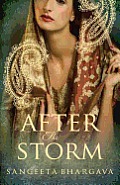 After the Storm by Sangeeta Bharava
After the Storm by Sangeeta Bharava
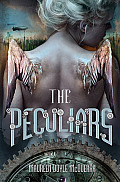 The Peculiars by Maureen Doyle McQuerry
The Peculiars by Maureen Doyle McQuerry
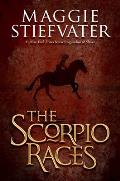 The Scorpio Races by Maggie Stiefvater
The Scorpio Races by Maggie Stiefvater

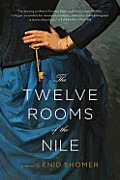 This is a work of fiction inspired by real people. Though I have hewed close to the facts, I have also taken liberties with them. [...] Flaubert and Nightingale did indeed tour Egypt at the same moment with nearly identical itineraries, but as far as we know, they never met. However, the historical record does suggest that they glimpsed each other in November 1849 while being towed through the Mahmoudieh Canal from Alexandria to Cairo. (449)
This is a work of fiction inspired by real people. Though I have hewed close to the facts, I have also taken liberties with them. [...] Flaubert and Nightingale did indeed tour Egypt at the same moment with nearly identical itineraries, but as far as we know, they never met. However, the historical record does suggest that they glimpsed each other in November 1849 while being towed through the Mahmoudieh Canal from Alexandria to Cairo. (449) Teenage Radley Parker-Hughes is volunteering at an orphanage in Haiti when the President of the United States is assassinated. Despite the reports that have managed to filter to her remote location, Radley decides that she must return home to be with her parents during this time of unrest. When she arrives in Manchester, New Hampshire, she finds the country under martial law. Her parents' phone has been disconnected. She can't take a bus to Battleboro because she lacks the appropriate travel documents for crossing state lines. Radley's only choice is to walk home along country roads, trying to avoid being caught out after the newly imposed curfews.
Teenage Radley Parker-Hughes is volunteering at an orphanage in Haiti when the President of the United States is assassinated. Despite the reports that have managed to filter to her remote location, Radley decides that she must return home to be with her parents during this time of unrest. When she arrives in Manchester, New Hampshire, she finds the country under martial law. Her parents' phone has been disconnected. She can't take a bus to Battleboro because she lacks the appropriate travel documents for crossing state lines. Radley's only choice is to walk home along country roads, trying to avoid being caught out after the newly imposed curfews.